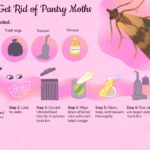Are tiny ants invading your kitchen, crawling across your counters and spoiling your peace? You’re not alone—and the good news is, you can take control.
These little invaders are not just annoying; they can contaminate your food and make your kitchen feel less like a safe space. But how exactly do you get rid of them quickly and effectively? This guide will show you simple, proven steps to eliminate tiny ants from your kitchen for good.
By understanding why ants come in and what attracts them, you’ll learn how to stop them at the source and keep your kitchen clean and ant-free. Keep reading—you’ll discover easy tips and natural tricks that actually work, so you can enjoy a fresh, pest-free kitchen once again.

Reasons Tiny Ants Invade Kitchens
Tiny ants invade kitchens mainly for three reasons: food attraction, moisture sources, and entry points. Kitchens often have crumbs, spills, and open containers that attract ants looking for sugar and grease. These small insects are drawn to even tiny bits of food left on counters or floors.
Moisture is another key factor. Leaky pipes, wet sinks, and damp areas provide ants with the water they need to survive. Kitchens with poor ventilation or standing water are especially prone to ant problems.
Entry points like cracks in walls, gaps around windows, and door frames let ants inside easily. They follow scent trails left by other ants to find food and water. Sealing these openings can help stop ants from coming in.
Identifying Tiny Ant Species
Common kitchen ants include tiny black ants, odorous house ants, and pharaoh ants. These ants are small, usually less than 1/8 inch long. They often invade kitchens searching for food and water. Odorous house ants give off a rotten smell when crushed. Pharaoh ants are known for forming large colonies and nesting inside walls. Tiny black ants are attracted to sugary and greasy foods. They leave pheromone trails to guide others to food sources.
These ants are mostly active during the day. They move quickly and form long lines along walls or counters. Their nests can be hidden in cracks, behind baseboards, or inside appliances. Ants communicate by leaving chemical trails that others follow. They are persistent and can return if the food source is not removed. Keeping the kitchen clean helps reduce their attraction.
Cleaning To Remove Food Traces
Keep all kitchen surfaces clean and dry to stop ants from finding food. Wipe counters and tables with a mild soap solution after cooking. Remove crumbs and spills immediately, especially sugary or greasy spots. These attract tiny ants quickly.
Regularly sweep and mop the floor to get rid of any fallen food bits. Pay close attention to corners and under appliances. Make sure to clean inside cabinets where food is stored.
Use airtight containers to seal food items like sugar, flour, and snacks. This stops ants from smelling and reaching the food. Avoid leaving open packages or uncovered dishes out.
Using Vinegar As A Deterrent
Vinegar masks ant trails by hiding the scent ants follow. Ants use pheromones to mark paths to food. Vinegar’s strong smell confuses them, making it hard to find food sources.
To prepare a vinegar spray, mix equal parts white vinegar and water in a spray bottle. Shake well to blend.
- Spray near ant entry points like doors and windows.
- Spray on ants directly, then wipe them up with a paper towel.
- Use the spray to clean kitchen counters and floors regularly.
Vinegar works best when applied often because its smell fades quickly. It only hides ant trails temporarily and does not kill the colony. Repeat applications are needed to keep ants away.
Natural Remedies For Ant Control
Borax and sugar baits attract ants and kill them slowly. Mix 1 part borax with 3 parts sugar. Add water to make a paste. Place small amounts near ant trails. Ants carry the bait back to the nest, killing the colony.
Essential oils like peppermint, tea tree, and lemon repel ants. Dab a few drops on cotton balls or spray diluted oil near entry points. The strong smell confuses ants and keeps them away.
Cinnamon and other spices such as cloves and black pepper work as natural barriers. Sprinkle these spices around windows, doors, and kitchen corners. Ants dislike the smell and avoid crossing these lines.
:max_bytes(150000):strip_icc()/TheSpruce_Howtogetridofandpreventodoroushouseants_colorv1-d55f1b3ffb8f44e1a34ba6d0a07bd4a0.png)
Commercial Ant Baits And Sprays
Effective commercial ant baits and sprays can help control tiny ants in kitchens. Choose products labeled safe for use around food areas. Look for baits that ants carry back to their nest. These bait stations attract ants and kill the colony at the source.
Use sprays with caution near food and utensils. Always read product instructions carefully. Avoid spraying directly on surfaces where food is prepared. Allow treated areas to dry completely before using them again.
Place baits and sprays near ant trails, entry points, and nests. Common spots include under sinks, behind appliances, and along baseboards. Keep products out of reach of children and pets for safety.
Sealing Entry Points
Check areas like window frames, door gaps, and cracks near pipes. These are common entry points for tiny ants. Look carefully for even the smallest openings. Use a flashlight to spot hidden cracks.
Seal these gaps with caulk to block ant paths. Apply weatherstripping on doors and windows to stop ants from sneaking in. Weatherstripping also helps keep your kitchen airtight.
Make sure the caulk is applied evenly. Fill all cracks and holes completely. This prevents ants from finding new ways inside.
Regularly inspect these areas to keep them secure. Replace worn weatherstripping to maintain a tight seal.

Preventing Future Infestations
Regular cleaning keeps tiny ants away by removing crumbs and spills quickly. Wipe kitchen counters, sweep floors, and clean under appliances often. Use mild soap and water to remove food scents ants follow.
Store food in sealed containers to block ants from accessing it. Keep fruits in the fridge and avoid leaving pet food out too long. Check packages for holes or sticky spots that attract ants.
Check the kitchen daily for small ant trails or nests. Early detection helps stop an infestation fast. Use a flashlight to look in dark corners and behind appliances. Trap ants near entry points to monitor their activity.
Frequently Asked Questions
Why Do I Get Tiny Ants In My Kitchen?
Tiny ants invade kitchens searching for food, especially sugary or greasy crumbs and spills. They follow scent trails to find these sources.
How Long Will Vinegar Keep Ants Away?
Vinegar keeps ants away for a few hours to a few days by masking their scent trails. Reapply regularly for continued effect.
How Do I Get Rid Of Little Ants On My Kitchen Counter?
Clean counters thoroughly to remove food and crumbs. Spray vinegar-water solution on ants and entry points. Seal cracks and store food in airtight containers. Repeat cleaning and spraying regularly to disrupt ant trails and prevent return.
How Do I Find Out Where Ants Are Coming From In My Kitchen?
Trace ants by following their trail from food sources to entry points like cracks, windows, or pipes. Check for crumbs or spills attracting them. Use a flashlight and damp paper towel to spot and wipe trails. Seal openings to block their path into your kitchen.
Conclusion
Tiny ants in the kitchen can be frustrating to handle. Keeping your kitchen clean removes their food sources. Sealing cracks and entry points stops ants from coming inside. Using natural sprays like vinegar disrupts their scent trails. Regular cleaning and vigilance prevent new ant problems.
Consistent effort helps maintain an ant-free kitchen space. Small steps make a big difference in controlling ants. Stay patient and keep your kitchen tidy every day.

Yes, working as , Food Blogger and Product Reviewer for last 6 years. Here you will get amazing deals for Smart kitchen products. I am your best source for the latest update in cooking trends. I provide insightful articles, reviews, and analysis on cutting-edge kitchen gadget. My mission is to empower readers with the knowledge they need to stay ahead in a rapidly evolving coking world. Join me as we explore the future of food technology and how it shapes our lives today and tomorrow.





